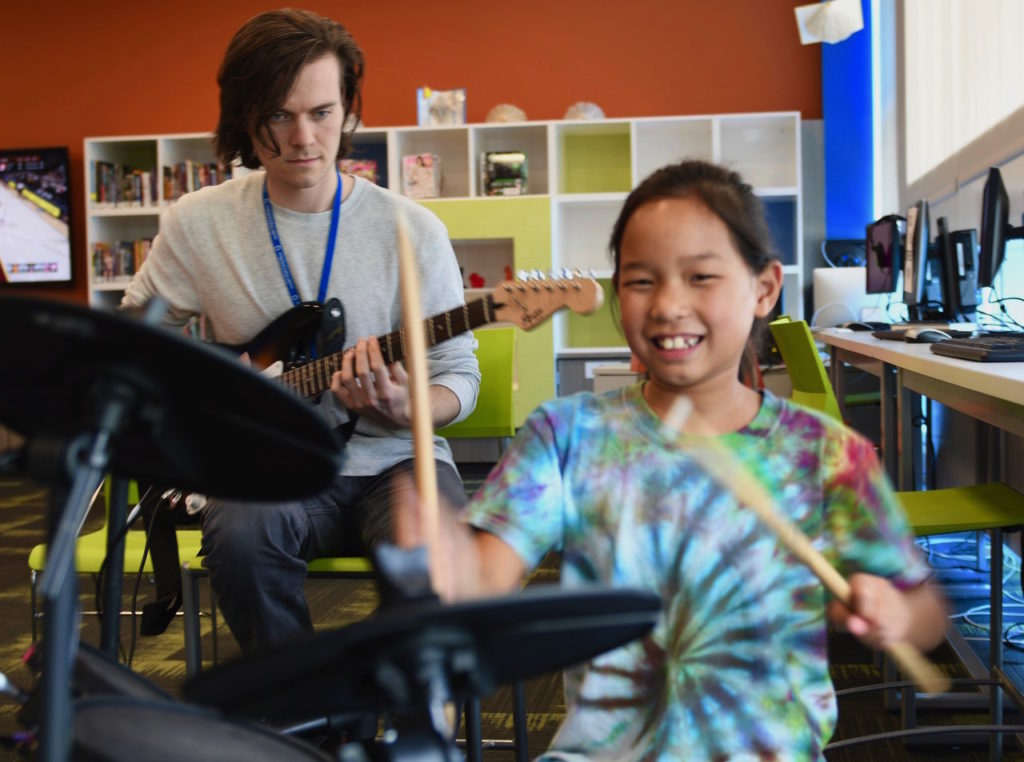
At the Nashville Public Library, cardholders can check out packets of seeds to grow hot peppers and mustard greens. They can attend free yoga classes or a professional development book club for adult educators.
Calling it a model for the nation and the world, Nashville’s public library was designated the 2017 Library of the Year by Library Journal and Gale this summer.
If libraries could win an Oscar, this would be it. Despite bleak predictions about the future of buildings housing books in an increasingly digital world, the award applauds Nashville for reimagining what a library can offer.
One Sunday afternoon in May, the Bellevue Branch hosted its first ukulele class, where beginners of all ages sat together in the community room learning to strum. More than 100 people showed up, and the 15 ukuleles available for check-out went fast.
“We believe people should have the opportunity to learn in any area of their life that they’re interested in,” says branch manager Katherine Bryant. “Music is one of those things that people in Nashville are certainly interested in.”
The Nashville system is not your grandmother’s library. It can’t be, says John Palfrey, author of a book called
BiblioTech: Why Libraries Matter More Than Ever in the Age of Google.
“People use Hulu or Netflix or Amazon Prime all the time. Then they’re thinking, ‘Well, what do I need a library for?’ ” Palfrey says. “So many great libraries, including the Nashville Public Library, are finding ways to prove that theory completely wrong.”
Palfrey says some libraries around the country are losing support, but in Nashville, annual city funding has increased by nearly 40 percent in the last decade to $29 million. The library foundation has grown to supply close to $3 million in additional private funding each year, allowing expansion and innovation.
Take a break on a walking trail. Go ahead and take a loaner laptop outside on the patio. Show up in the afternoon during the school year, and you’ll likely see a crowd of teens in the Nashville After Zone Alliance, a free program where quiet spaces and homework help are available, but so are rabble-rousers like Joe Zempel.
“I’m the music mentor,” Zemple says. “We have a robotics mentor, graphic design, video mentor — we have all types. Music is my specialty, but really, if you are interested in anything that maker spaces have to offer, we have a mentor here who’s an expert in that field.”
This is the library, and instead of shushing kids, he hands them drumsticks.

“I issue them drum challenges, for non-drummers playing a beat for the first time,” he says. “Only a few kids have ever gotten it.”
Community partnerships are key to providing all of these non-literary materials, like the Ukulele Collective of Tennessee, Guitar Center, Fanny’s House of Music, Lucky U Review, Kala Brand Music Company and the Nashville Ukulele Society that helped get the Bellevue program started. Library director Kent Oliver can’t even name how many partners the library now has.
“If we started making a list now, we’d be sitting here for half an hour,” he says. “There are that many.”
Constituencies are broad and inclusive: There is information for those who want to apply for citizenship, computers and laptops and free Internet for county residents who may not have that at home, and personal assistance for people who need help applying for a job online. Special book sections carry easy readers specifically for adults learning to read. Staff go to area preschools to show teachers how to incorporate literacy into their classrooms — and bring the puppet truck, too.
The library has become more of a hub with a mission to help solve community problems. “We’re not political,” Oliver says. “Our politics are library, and library politics are that everybody has a voice and the programs are meaningful and they represent all viewpoints.”
Case in point: the downtown library’s Civil Rights Room. School children come in to sit at a model lunch counter and learn about Nashville’s famous nonviolent sit-ins of 1960. Now, local and state police cadets also come to talk about race and inclusion.
“People don’t think about the fact that a library can really change the way people interact in a community for the better,” Oliver says.
Nashville’s library has extended its reach with the Limitless Libraries program, which has received national attention for giving the city’s schoolchildren easy access to the entire collection. Right from school, students order books, receive them, and return them, ensuring the public library has a place in the daily life of young readers.
Graham Waltenbaugh, who just finished fourth grade at Lockeland Elementary Design Center, says it took him about a week to read every book in his school’s Pokemon collection, so he got onto the computer and checked the public library’s collection.
“There was a lot more,” he says. “There wasn’t just more books, there was more
series of books. … I’m still not done.”
But the Nashville library hasn’t just started innovating. One of its oldest and most cherished programs still earns international acclaim, and was also one of the reasons cited for the award: the marionette shows for children started by local teen Tom Tichenor nearly 80 years ago. Even back then, the city library was open to a broader view of literacy — and its mission.


